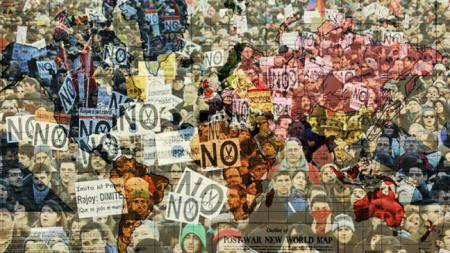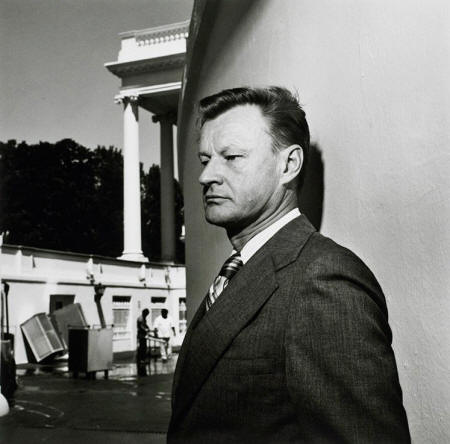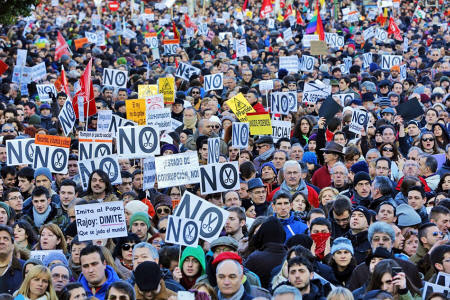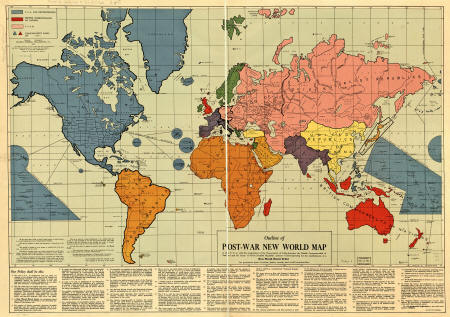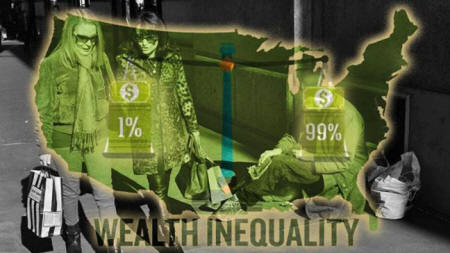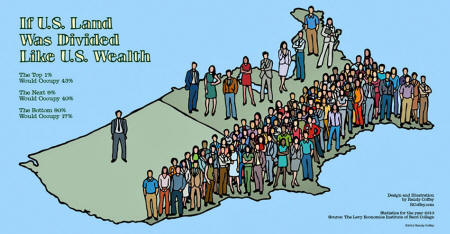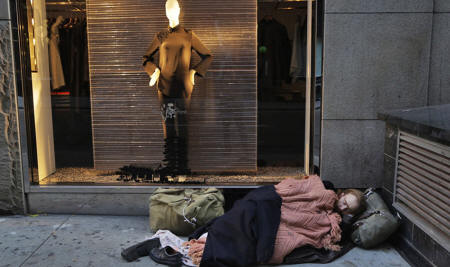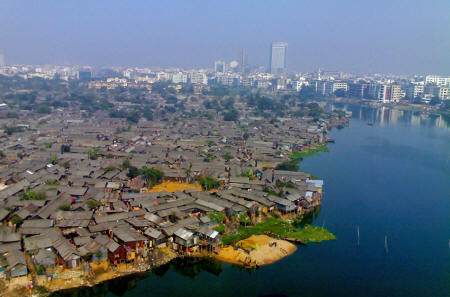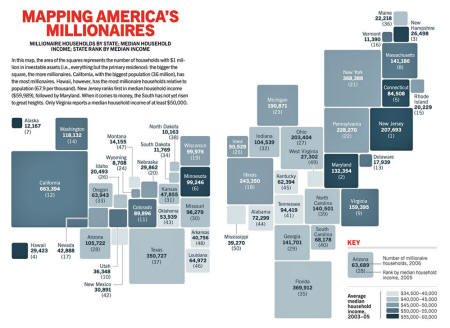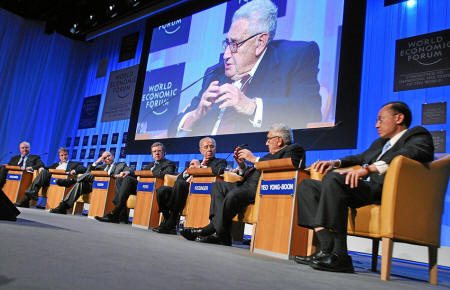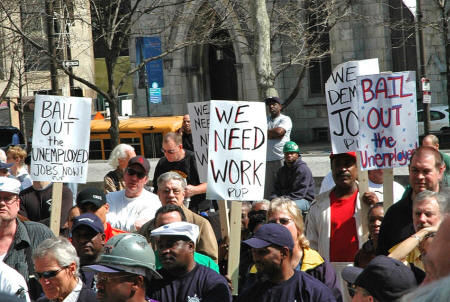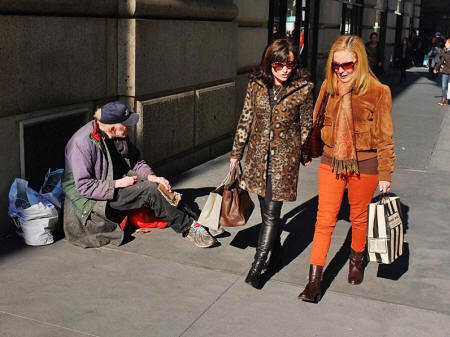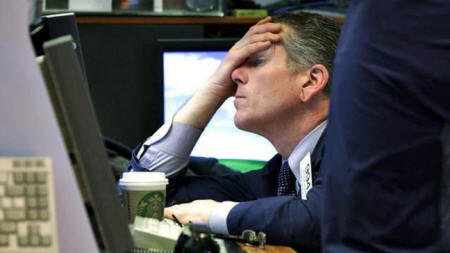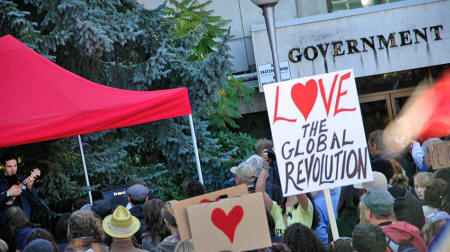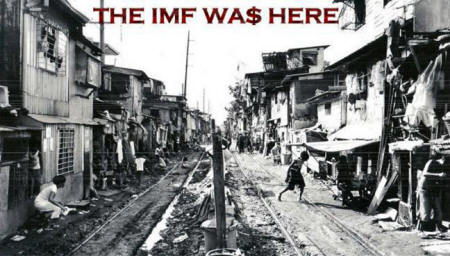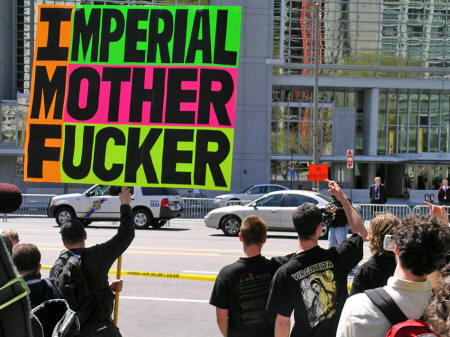|
2013-2014
from
Occupy Website
The Global Awakening
The world today is in the midst of the most monumental social, political and economic upheavals in human history - a state of continual protests, uprisings and what may be considered inevitable revolution on a global scale.
Power that had been centralized for roughly 500 years among the Atlantic powers of Western Europe and North America is rapidly shifting to include the rise of the East, as China, India and others operating within established, institutional frameworks of power get wooed by the former Western imperial managers to become colluders in empire, instead of competition.
To add to this, global wealth and power is being centralized among a highly interconnected and transnational ruling class:
It is this numerically minute group of plutocrats whom empire serves.
Long established among the Western elites, this group of plutocrats is attempting to bring the oligarchies of other powerful and rising states firmly within its organizational and ideological structure.
Think of it as an established Mafia that helped build up a few other crime families in order to extend its influence - and which now has to contend with the increasing autonomy and competition that these strengthened crime families pose, as it attempts to bring them closer within the established ‘Family’ instead of risking an all-out Mafia war in which all parties would surely lose.
The changing structures of global power, along with the ever-increasing unrest of populations around the world, has created perhaps the most challenging situation for any empire in human history.
Zbigniew Brzezinski has written and spoken for years on the issue, publishing in establishment journals and speaking at elite think tanks about what he calls the "Global Political Awakening."
Brzezinski is not a casual observer nor a resigned academic; he sits within the heart of the intellectual and institutional foundations of the American empire alongside other notable figures such as Henry Kissinger and Joseph Nye.
Brzezinski was even recruited as a foreign policy adviser to the 2008 presidential campaign of Barack Obama, who referred to Brzezinski as,
Brzezinski wrote in 2005 that the United States needed to face,
Thus, the "central challenge" for the U.S., noted Brzezinski,
In a 2004 speech to the elite-populated Carnegie Council, Brzezinski explained that the global awakening was partly,
In other words, American imperialism is - by its very nature - creating its antithesis: the global awakening.
The awakening "is also fueled by globalization," Brzezinski further explained,
The process of globalization, however,
In other words, since the end of the Cold War, when Marxism and Communism represented the largest and most organized global ideological challenge to Western state-capitalist democracy, Brzezinski maintains there has been an ideological vacuum in terms of ideas opposing the present global order.
The global awakening, however, is changing the circumstances.
Brzezinski noted in 2005 that,
The youth of the Third World represent,
The "potential revolutionary spearhead" of the Third World youth was, in Brzezinski’s view,
Having largely originated from,
In 2008, Brzezinski wrote in the New York Times that,
In his view, the necessary course of action,
Brzezinski noted, in a speech he gave that same year to Chatham House, that,
Later, in a 2010 speech to the Canadian International Council (CIC), an elite think tank based in Canada, Brzezinski explained (below video) the "total new reality" of the awakening of mankind, explaining that,
In a 2012 speech at the European Forum for New Ideas (EFNI), Brzezinski stated that 20 years following the end of the Cold War,
As Brzezinski explained to his fellow elites and imperialists in the United States and other powerful Western societies:
As he stated at Chatham House in 2008, the world’s major powers,
Institutional and imperial power structures have never been more globalized or concentrated in human history; yet, simultaneously, never have they been under more threat from an awakened humanity.
We have unprecedented access to information and communication; never have we had a greater opportunity to transform the world for the better and to challenge - or make obsolete - the prevailing global power structures.
Yet, simultaneously, never has humanity - collectively - faced such a monumental challenge: a combination of a massive global economic crisis, growing levels of poverty and hunger, tens of millions dying from poverty-related causes every year, massive global land grabs, high-tech police states and surveillance societies, murder by remote control drone terror campaigns, a more distanced decision-making apparatus than perhaps ever before, and an ecological crisis of such proportions that it threatens the very survival of the human species, let alone all other life forms on Earth.
The World of Resistance (WOR) Report is a new Occupy.com series that aims to provide greater context and understanding about the causes, and the consequences, of social unrest, protests, riots, resistance, uprisings, rebellions and revolutions spreading across the globe.
What form is the "global political awakening" taking in different regions, under different conditions, and with what differing degrees of success and failure?
This series aims to explore the evolution of the long road to world revolution so that we may better understand, and support, the causes of human and biological survival to ensure that people's "central challenge" to elites - that is, the quest for "human dignity" - is made all the more impossible for 1% institutions and ideologies to undermine or repress.
Inequality, Injustice and the Coming Unrest
Brzezinski has written and spoken extensively to elites at American and Western think tanks and journals, warning that this awakening poses the "central challenge" for the U.S. and other powerful countries, explaining that,
Mankind, Brzezinski said in a 2010 speech,
But Brzezinski is hardly the only figure warning elites and elite institutions about the characteristics and challenges of an awakened humanity.
The subject of inequality - raised to the central stage by the Occupy movement - has become a fundamental feature in the global social, political and economic discussion, as people become increasingly aware of the facts underlying the stark division between the haves and have nots.
While inequality is both a source and a result of the concentration of power in the hands of a few, it also represents the greatest threat to those very same power structures and interests.
As many if not most of us are by now aware, the global state-capitalist system is run by a relatively small handful of powerful institutions, groups and individuals who collectively control the vast majority of planetary wealth and resources.
Banks, corporations, family dynasties and international financiers like the IMF and World Bank form a highly interconnected, interdependent network we now think of as the global oligarchy.
Thomas Pogge explained in the Georgia Journal of International and Comparative Law that in the 20 years following the end of the Cold War, there were roughly 360 million preventable poverty-related deaths - more than all of the deaths in all of the wars of the 20th century combined.
By 2004, over 1 billion people remained "chronically undernourished" and nearly a billion lacked access to clean drinking water and shelter. Roughly 1.6 billion lacked access to electricity while 218 million children were working as cheap labour.
Pogge noted that almost half of humanity - roughly 3.5 billion people - lived on less than $2.50 a day, and that all of these people could be lifted out of poverty with an expenditure $500 billion, which is roughly two-thirds of the annual U.S. Pentagon budget.
Preceding the statistics that would get popularized with the Occupy movement, Pogge asserted that the top 1% owned approximately 40% of global wealth while the bottom 60% of humanity owned less than 2%.
Still today, every year, approximately 18 million people - half of whom are children under the age of five - die from poverty-related causes, all of which are preventable.
Seen through this lens, poverty, and by definition, inequality, has become the greatest purveyor of violence, death and injustice on Earth.
Meanwhile, the international charity Oxfam noted that the 100 richest people in the world made a combined 2012 fortune of $240 billion - enough to lift the world’s poorest out of poverty four times over.
In the previous 20 years, the world’s richest 1% increased their income by 60%, perpetuating a system of extreme wealth which is, according to an Oxfam executive,
Not only that, a former chief economist for McKinsey & Company published data in 2012 for the Tax Justice Network that reported the world’s super rich had hidden between $21 and $32 trillion in offshore tax havens - a trend that has been increasing in the past three decades to reveal that inequality is, In early 2014, Oxfam released a report revealing that the world’s 85 richest individuals had a combined wealth equal to the collective wealth of the world’s poorest 3.5 billion people - approximately $1.7 trillion.
Meanwhile, the world’s top 1% own roughly half the world’s wealth, at $110 trillion.
What Does All the Inequality Mean in Terms of Instability?
Where there is great inequality, there is great injustice and where there is great injustice, there is the inevitability of instability.
This relationship, between inequality and instability, has not gone unnoticed by the world’s oligarchs and plutocratic institutions. The potential for "social unrest" has gotten especially high since the onset of the global financial and economic crisis that began in 2007 and 2008.
The head of the OECD warned in 2009 that the world’s leading economies would have to take quick action to resolve the global crisis or face a "fully blown social crisis with scarring effects on the vulnerable workers and low-income households."
The major credit ratings agency Moody’s warned back in 2009 that the growing debts among nations would "test social cohesiveness" as investors demanded countries impose still more painful austerity measures, leading to growing "political and social tension" and "social unrest."
In February of that same year, the Director-General of the World Trade Organization (WTO) warned that following the economic crisis, many nations were,
And meanwhile, the top-ranking U.S. military official and Chairman of the Joint Chiefs of Staff, Admiral Mike Mullen, commented that the global financial crisis was a greater security concern to the U.S. than either of the massive ground wars in Iraq or Afghanistan.
Mullen's point was reiterated by U.S. intelligence director Dennis Blair, who warned Congress that the global crisis was,
Blair noted that as a result of the crisis, roughly 25% of the world’s nations had already experienced,
U.S. intelligence analysts were also fearful of a "backlash against U.S. efforts to promote free markets because the crisis was triggered by the United States."
In November of 2008, the U.S. Army War College produced a document warning that the U.S. military must be prepared for the possibility of a,
Under "extreme circumstances," the document warned,
In 2009, the British spy agency MI5, along with the British Ministry of Defence, were preparing for the potential of civil unrest to explode in Britain's streets as a result of the economic crisis, [noting] that there was a possibility the state would deploy British troops in major cities.
A December 2009 article in The Economist warned that increased unemployment and poverty along with "exaggerated income inequalities" following the global economic crisis made for a "brew that foments unrest."
In October of 2011, the International Labour Organization warned in a major report that the jobs crisis resulting from the global economic crisis "threatens a wave of widespread social unrest engulfing both rich and poor countries," and pointed out that 45 of the 118 countries studied already saw rising risks of unrest, notably in the E.U., Arab world and Asia.
In June of 2013, the same ILO warned that the risks of social unrest including "strikes, work stoppages, street protests and demonstrations," had increased in most countries around the world since the economic crisis began in 2008.
The risk was "highest among the E.U.-27 countries," it noted, with an increase from 34% in 2006-2007 to 46% in 2011-2012.
The most vulnerable nations in the E.U. were listed as Cyprus, Czech Republic, Greece, Italy, Portugal, Slovenia and Spain, a fact,
The E.U.’s,
An October 2013 report by the International Federation of Red Cross and Red Crescent Societies warned that the long-term consequences of austerity policies imposed by E.U. governments,
The report noted:
The study further reported,
In November 2013, The Economist reported:
While there are various triggers - from economic distress (Greece and Spain) to revolts against dictatorships (the Arab Spring) to the growing aspirations of middle class populations (Turkey and Brazil),
The common feature, it noted,
A sister company of The Economist, the Economist Intelligence Unit (EIU), measured the risk of social unrest in 150 countries around the world, with an emphasis on countries with institutional and political weaknesses.
The EIU noted that,
Indeed, the decline in trust has been accelerating across the developed world since the 1970s.
The fall of Communist East European regimes in 1989 eroded that trust further, and the process sped up once again with the onset of the global financial crisis.
According to EIU estimates, roughly 43% (or 65) of the countries studied were considered to be at "high" or "very high" risk of social unrest in 2014. A further 54 countries were considered to be at "medium risk" and the remaining 31 were considered "low" or "very low."
Comparing the results to a similar study published five years previously, an additional 19 countries have been added to the "high risk" category.
Among the countries considered a "very high risk" for social unrest in 2014 were,
Among the countries in the "high risk" category were,
It doesn't take demonstrators filling the streets to tell us that inequality breeds instability.
While many factors combine under different circumstances to lead to "social unrest," inequality is almost always a common feature. Injustice, poor governance, corruption, poverty, exploitation, repression and corrosive power structures all support and are supported by underlying conditions of inequality.
And as inequality is no longer a local, national or regional phenomenon but a global one, so too is the "threat" of instability that the world's elite financial, media and think-tank institutions are now so busy warning about. So long as inequality increases, so will instability.
Resistance, and even revolution, are the new global reality.
As an annual gathering of thousands of leading financial, corporate, political and social oligarchs in Davos, Switzerland, the World Economic Forum (WEF) has taken a keen interest in recent years discussing the potential for social upheaval as a result of mass inequality and poverty.
A WEF report released in November of 2013 warned that a "lost generation" of unemployed youth in Europe could potentially pull the Eurozone apart.
One of the report's authors, the CEO of Infosys, commented that,
The report added:
In short, if the global ruling class - known affectionately as the Davos Class - doesn't quickly find ways to accommodate the continent's increasingly unemployed and "lost" youth, those people will potentially turn to "populist politics" of resistance that directly challenge the global political and economic order.
For the individuals and interests represented at the World Social Forum, this poses a monumental and, increasingly, an existential threat.
The World Economic Forum’s Global Competitiveness Report for 2013-2014, entitled "Assessing the Sustainable Competitiveness of Nations," noted that the global financial crisis and its aftermath "brought social tensions to light" as economic growth was not translated into positive benefits for much or most of the planet's population.
Citing the Arab Spring, growing unemployment in Western economies and increasing income inequality, there was growing recognition that dangerous upheaval could be on the way.
The report noted:
The WEF report wrote that,
The report concluded that numerous nations were at especially high risk of social unrest, including China, Indonesia, Turkey, South Africa, Brazil, India, Peru and Russia, among others.
In early 2014, the World Economic Forum released the 9th edition of its Global Risks report, published to inform the debate, discussion and planning of attendees and guests at the annual WEF meeting in Davos.
The report was produced with the active cooperation of major universities and financial corporations, including Marsh & McLennan Companies, Swiss Re, Zurich Insurance Group, National University of Singapore, University of Oxford, and the University of Pennsylvania’s Wharton Risk Management and Decision Processes Center.
It included a large survey conducted in an effort to assess the major perceived risks to the global order atop which the Davos Class sits.
The report noted that the "most interconnected" risks were fiscal crises, structural unemployment and underemployment, all of which link to "rising income inequality and political and social instability."
The young generation now coming of age globally, noted the WEF, "faces high unemployment and precarious job situations, hampering their efforts to build a future and raising the risk of social unrest." This "lost generation" faces not only high unemployment and underemployment, but also major educational challenges since,
Perceiving the innovations and skills of today's generation which are enabling the growing foment, the Forum noted:
The Global Risks 2014 report cited a global opinion survey on the,
This generation, noted the survey,
The "mindset" of today's youth has been additionally shaped by the repercussions and apparent failures to deal with the global financial crisis, as well as increasing revelations about U.S. intelligence agencies engaging in massive digital spying.
For a generation largely mobilized through social media, online spying has held particular relevance, as,
Protests and anti-austerity movements were able to,
The youth,
According to the World Bank, more than 25% of the world’s youth, or some 300 million people, "have no productive work."
On top of this,
This fact,
Noting that more than 1 billion people currently live in slums - a number that has been steadily increasing as income inequality rises - the report stated that
Growing income inequality is now being termed a "systemic risk," according to the WEF.
And in a stark admission from that institution representing the world’s major profiteers of global capitalism, the report acknowledged that globalization ,
The four major "emerging market" BRIC nations of Brazil, Russia, India and China,
But slow political reforms within these countries, coupled with external economic shocks (like financial crises caused by Western nations and their corporate institutions) could aggravate the "existing undertones of social unrest."
Within the BRIC nations and other emerging market economies,
Collectively, these groups,
Further, a,
Both Brazil and Turkey have made universal healthcare systems a constitutional obligation, which was a stated ambition of other emerging market nations such as India, Indonesia and South Africa.
The failure to create these healthcare systems "may arouse social unrest," warned the WEF.
The World Economic Forum’s chief economist, Jennifer Blanke, stated:
David Cole, the group chief risk officer of Swiss Re (one of the contributing companies to the WEF report) commented:
The World Economic Forum’s Risk report for 2014 was primarily concerned with "the breakdown of social structures" and "the decline of trust in institutions."
It warned of risks of,
All of these issues relate directly "to the future of the youth."
It’s an interesting paradox for an organization to see the greatest threat to its ideological and social power being "the future of the youth" when it has already written off the present generation as "lost."
However, this is a view shared not only by the World Economic Forum but, increasingly, by other powerful institutions creating something of an echo chamber through the mainstream media.
The head of the IMF has warned that youth unemployment in poor nations was "a kind of time bomb," and the head of the International Labor Organization (ILO) warned in 2011 that the,
While there was,
In April of 2014, the World Economic Forum on Latin America reported that the primary challenge for the region was "to reduce inequality," noting that between 70 and 90 million people in Latin America had entered what were referred to as the "consuming classes," or "middle classes," over the previous decade.
However, Marcelo Cortes Neri, Brazil’s Minister of Strategic Affairs, explained,
He added that the emerging so-called "middle class" in Latin America and elsewhere,
Neri then posed the question:
In particular, youth between the ages of 15 and 29 raised specific concerns for Latin America’s elite, with Neri warning:
When one of the world’s most influential organizations representing the collective interests of the global oligarchy openly acknowledges that globalization has increased inequality, and in turn, that inequality is fueling social unrest around the world manifesting the greatest potential threat to those oligarchic interests, we can safely say we're entering a new era of global instability and resistance.
In November of 2011, Bob Diamond, the CEO of one of the world’s largest banks, Barclays, stated in a speech:
Diamond added:
A March 2013 report by senior economic adviser George Magnus of UBS Investment Research, entitled "Social Unrest and Economic Stress - Europe’s Angst, and China’s Fear" noted that,
Yet, he wrote, the occasional upsurge in large-scale national and European-wide anti-austerity protests and strikes,
Since 2010, approximately 13 out of 19 E.U. governments had been voted out of office or had collapsed, indicating that,
Social unrest, added the UBS report,
Social unrest across the E.U.
This "lull" in social unrest, warned Magnus, "is most likely deceptive."
The present problem in Europe "is the same" as the main problems in Europe of the 1930s - when mass poverty, unemployment and social unrest led to the rise of fascism.
The underlying problem in both eras was,
Citing an OECD study, the bank report noted that,
There have been,
These are especially important matters for banks to pay attention to, since the European debt crisis was caused primarily by the big banks - and the austerity and "structural reform" policies (along with the bailouts that accompanied them) were designed for the benefit of those banks as well.
Thus, resistance to austerity and "reform" is, in effect, resistance to the bailouts for the big banks.
In May of 2013, JPMorgan Chase released a report, "The Euro Area Adjustment: About Halfway There," which assessed "progress" in the European Union on the issue of austerity and structural reform.
The "adjustment" of European society, claimed the report, was "about halfway done on average," noting that the process would continue for much of the rest of the decade although it faced major challenges, including the development of "new institutions" in the E.U. and what the bank called "national legacy problems."
This vague term referred to,
Just what does this mean?
The bank explained that "fiscal austerity" was likely to be a major feature in the E.U. "for a very extended period."
However, if the European Monetary Union is to survive the coming decade, "deep seated political problems in the periphery... need to change." But what precisely are these "deep seated problems"?
The bank elaborated that many of the southern periphery states’ constitutions "tend to show a strong socialist influence," referring to the fact that many constitutions guaranteed various social rights for populations, including labor, healthcare and educational and civil rights.
Further, the bank reported that many of these nations suffer from the following features:
The translation: democracy itself is the problem. As such, JPMorgan noted,
In other words, out with democracy and in with financial and corporate oligarchy.
The bank’s report also noted that there were a number of potential threats as the process of "political reform" advanced, including,
JPMorgan Chase warned that while there wasn’t a current situation of "ungovernability" in E.U. states, the longer-term prospects were,
AXA, one of the world’s largest financial institutions and insurance companies, published a report in July of 2013 written by Manolis Davradakis, entitled "Emerging Unrest: Looking for a Pattern," which expressed particular concerns and perspectives on the issue of social unrest.
The report noted that emerging market economies,
The "main cause" of unrest in emerging market nations was,
The report cited examples of social unrest in Turkey and Brazil, warning that these countries could see their credit ratings cut if the social upheaval is "lasting."
The AXA report referred to the multiple episodes of unrest across emerging market nations in the summer of 2013 as "riots," stating that they had several points in common, namely that,
These factors were reminiscent of the massive unrest that took place in the advanced economies during the 19th century when emerging middle classes were struggling,
Beyond a certain point, warned AXA,
A government’s inability or lack of will,
AXA devised a Poor Governance Index (PGI), analyzing seven key indicators that could lead to social unrest, and concluded that the potential for instability in the BRIC nations - Brazil, Russia, India and China - was quite high.
It also cited increased potential for unrest in Egypt, Ukraine, Indonesia, South Africa, Tunisia and Turkey, warning that such unrest,
It noted that several credit ratings agencies had already warned about the effects that "prolonged social unrest" could have on the ratings for Turkey and Brazil.
Going further, in July of 2013, Stephen D. King, chief economist of HSBC bank, warned that growing wealth gaps and increasing divisions between generations could result in youth uprisings similar to the Peasants Revolt of the Middle Ages.
King commented:
In October of 2013, King wrote an op-ed for the New York Times in which he warned that as bad as things already were,
King wrote that,
The "bleak" reality is that these and other big banks and financial institutions have repeatedly collapsed the global economy and profited along the way, punishing entire societies and populations into poverty through a process of plundering and exploitation as governments feared the wrath of "financial markets."
The banks that are now bigger, more dangerous and more powerful than ever fear the growing discontent, unrest and resistance of populations - especially the youth.
The world’s major financial institutions fear that the global economic system which they helped to create, and over which they rule, will ultimately come back to haunt them in the form of mass social unrest, potentially undermining their power and the system as a whole.
These two groups - financial institutions and the consultants that advise them - play key roles in the spread of institutionalized corporate and financial power, and as such, warnings from these groups about the threat posed by "social unrest" carry particular weight as they are geared toward a particular audience: the global oligarchy itself.
Organizations like the International Monetary Fund (IMF) and World Bank were responsible for forcing neoliberal economic "restructuring" on much of the developing world from the 1980s onwards, as the IMF and E.U. are currently imposing on Greece and large parts of Europe.
The results have been and continue to be devastating for populations, while corporations and banks accumulate unprecedented wealth and power.
As IMF austerity programs spread across the globe, poverty followed, and so too did protests and rebellion.
Between 1976 and 1992, there were 146 protests against IMF-sponsored programs in 39 different countries around the world, often resulting in violent state repression of the domestic populations (cited explicitly by Firoze Manji and Carl O’Coill in "The Missionary Position: NGOs and Development in Africa," International Affairs, Vol. 78, No. 3, 2002).
These same programs by the IMF and World Bank facilitated the massive growth of slums, as the policies demanded by the organizations forced countries to undertake massive layoffs, privatization, deregulation, austerity and the liberalization of markets - amounting, ultimately, to a new system of social genocide.
The new poor and displaced rural communities flocked to cities in search of work and hope for a better future, only to be herded into massive urban shantytowns and slums.
Today roughly one in seven people on Earth, or over 1 billion, live in slums (an excellent source on this is Mike Davis's "Planet of Slums".)
How the Big Institutions Have Operated
Joseph Stiglitz, the Nobel Prize-winning former chief economist at the World Bank, blew the whistle on the World Bank's and IMF's policies in countries around the world - an act for which he was ultimately fired.
In an interview with Greg Palast for the Guardian in 2001, Stiglitz explained that the same four steps of market liberalization are applied to every country.
The first includes privatization of state-owned industries and assets.
The second step is capital market liberalization, which,
As Stiglitz explained, speculative cash flows into countries, and when there are signs of trouble it flows out dramatically in a matter of days, at which point the IMF demands the countries raise interest rates as high as 30% to 80%, further wrecking the economy.
At this point comes step three, called "market-based pricing," in which prices get raised on food, water and cooking gas, leading to what Stiglitz calls "Step-Three-and-a-Half: the IMF riot."
When a nation is,
This process is always anticipated by the IMF and World Bank, which have even noted in various internal documents that their programs for countries could be expected to spark "social unrest."
And finally comes step four, "free trade," meaning that highly protectionist trade rules go into effect under supervision of the World Bank and World Trade Organization.
Expecting Riots
The term "IMF riots" was applied to dozens of nations around the world that experienced waves of protests in response to the IMF/World Bank programs of the 1980s and 1990s, which plunged them into crisis through austerity measures, privatization and deregulation all enforced under so-called "structural adjustment programs."
As the Guardian noted in September of 2012,
Thus, we saw "IMF riots" - protests against austerity and structural adjustment measures - erupting over the past three years in Greece, Spain, Portugal and elsewhere in the E.U.
An academic study published in August of 2011 by Jacopo Ponticelli and Hans-Joachim Voth examined the link between austerity and social unrest, analyzing 28 European countries between 1919 and 2009, and 11 Latin American countries since 1937.
The researchers measured levels of social unrest looking at five major indicators: riots, anti-government protests, general strikes, political assassinations and attempted revolutions.
The verdict:
In other words, the more that austerity was imposed, the more unrest resulted. Spending cuts, they wrote,
The Eurozone has been referred to by some as,
This has created a "lost generation" in which unemployment in the E.U. for youths between 16 and 24 amounts to roughly 25% - while in Italy it's roughly 40% and for Greece and Spain it’s as high as 60%.
Tom Rogers, an adviser to Ernst & Young, noted,
The head of the IMF, Dominique Strauss-Kahn, warned in 2008 that,
The head of the World Bank, Robert Zoellick, warned in 2009 that,
Additionally, in November of 2009, the IMF chief warned the premier British corporate lobbying group, the Confederation of British Industry (CBI), that if a second major bailout of the banks were to occur, democracy itself would be jeopardized.
Consulting in the Midst of a Crisis
Global consulting firms play a peculiar role in the global economic order.
The consulting, or "strategy," firms became commonplace in the 1960s onward, and were frequently seen as "home to some great minds in the corporate world," hired by corporate, financial and other institutional clients to advise management on strategy and investments.
The Financial Times referred to the industry as,
According to an Oxford team of researchers, in 2011 consulting firms advised on more than $13 trillion of U.S. institutional money.
Worldwide, consultants advised roughly $25 trillion worth of assets. Consulting advice was seen to be "highly influential" in the United States; yet despite the enormous power wielded by consultancy firms, the Oxford study found that the funds recommended to investors by consultants did not in the end perform better than other funds.
Still, the influence of giant consulting firms remains, although their reputations have taken some hits along the way.
The world’s largest consulting firms at the end of 2013 were McKinsey & Company, Bain & Company, Boston Consulting Group, Booz & Company, PricewaterhouseCoopers, Oliver Wyman, Deloitte Consulting, The Parthenon Group, A.T. Kearney and Accenture.
With these large firms advising even larger clients on strategy and investments, it's worth examining some of the advice and perspectives published by these agencies.
For example, McKinsey & Company, the world’s largest global management consulting firm, published a report in 2012 (Dominic Barton, "Capitalism for the Long Term," Autumn 2012) noting that in the previous few years the world had been witnessing,
For corporate executives,
And while,
Having interviewed over 400 business and government leaders around the world, the McKinsey report noted that,
However, the report warned,
McKinsey & Company thus called for,
In another instance, KPMG, one of the world’s leading accountancy firms and professional service providers, published a report in 2013 examining a list of "megatrends" in the world leading up to the year 2030 ("Future State 2030: The Global Megatrends Shaping Governments," KPMG International, 2013).
One of the major trends it referred to was,
This process is "ushering in a new era in human history," KPMG went on.
With major social issues left unresolved such as growing inequality and access to education, services, employment and healthcare,
The report further warned that there were other major consequences with the,
The fact that populations are,
John Herhalt, a former partner at KPMG, was quoted in the report as saying,
Further, a 2013 survey of 1,300 CEOs from 68 countries by PricewaterhouseCoopers, another of the world's largest consulting firms, reported general views shared by CEOs around the world ("Dealing With Disruption: Adapting to Survive and Thrive," 16th Annual Global CEO Survey).
When asked about the ability of firms to deal with the potential impact of disruptive scenarios, the vast majority (75%) of CEOs responded that their companies,
This was perceived as a greater threat than an economic slowdown in China.
CEOs, noted the report,
Due to the revolution in social media, it concluded, many new,
After in-depth analyses of documents, speeches and reports from the world’s major economic institutions - from international organizations like the World Bank and IMF to global consultancy firms like McKinsey & Company and PricewaterhouseCoopers; and from big banks like HSBC, JPMorgan Chase and UBS to oligarchic platforms like the World Economic Forum - three issues are prevalent in terms of assessing the fears and threats facing the global elite:
It should be clear by now that as global inequality continues to rise, trust in institutions will continue to fall, and social unrest will explode in new and more dramatic ways than we have witnessed thus far.
We truly are entering a World of Resistance.
|

